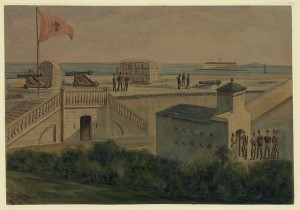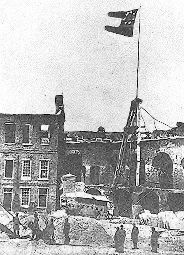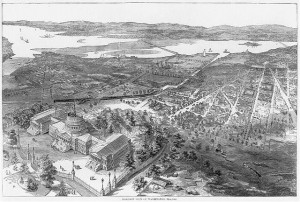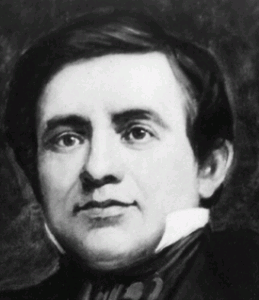The Surrender of Fort Sumter
The Civil War Daily Gazette has a great piece on the April 14, 1861 surrender of Fort Sumter. My post on April 13th reproduced a New-York Times article that said that Fort Sumter had been surrendered and evacuated by April 13th. That obviously was not true. It’s a good lesson in taking stuff I read with a grain of salt. As can be seen at the beginning of the following excerpt, by April 14th people in Washington realized that not all the reports they were getting were true.
Lincoln’s Response to the Virginia Commissioners
The Lincoln administration wasn’t dealing with the attack on Fort Sumter in a vacuum. There were other matters to deal with: rumors circulated that the South was going to invade Washington, D.C., and Lincoln had to deal with those three commissioners from the Virginia secession convention. As it turned out he used his April 13th meeting with the Virginia delegation to more clearly explain his policy to the whole country. He gave the text of his response to newspapers to publish. From The New-York Times April 15, 1861 (The New York Times Archive):
WASHINGTON, Sunday, April 14.
The excitement here throughout the day has been intense. People gather in groups on the streets and in the hotels, discussing affairs at Charleston and the probabilities of the future.
There is great diversity of opinion relative to the reliability of the news that Major ANDERSON has surrendered. The dispatches to the Associated Press are evidently full of blunders, which cast suspicion on the whole.
The President, nevertheless, has intelligence which satisfies him that the news is too true Private dispatches from Charleston, signed by trusty men, also confirm it; but as the telegraph is known to have been constantly tampered with by the secession authorities, it is feared that even private dispatches may have been mutilated for the purpose of cutting the Government off from all possible means of correct information. …
The rumor that it has been decided to cut off all the mails from the seceded States is premature, to say the least. The Government does not recognize secession, and does not wish to punish the true men of the South together with the traitors. Wherever the mails are interfered with, they will be cut off, but probably not elsewhere. At least no determination otherwise has yet been arrived at by the President, notwithstanding his reference to the subject in the following letter to the Committee of the Virginia Convention, delivered by the President yesterday:

Part of the "unprovoked assault" on Sumter: Fort Moultrie 1861 (Library of Congress - LC-DIG-ppmsca-22981)
To Hon. Messrs. Preston, Stuart and Randolph:
GENTLEMEN: As a Committee of the Virginia Convention, now in session, you present me a preamble and resolution in these words:
Whereas, In the opinion of this Convention, the uncertainty which prevails in the public mind as to the policy which the federal Executive intends to pursue towards the seceded States, is extremely injurious to the industrial and commercial interests of the country, tends to keep up an excitement which is unfavorable to the adjustment of the pending difficulties and threatens a disturbance of the public peace; therefore,
Resolved, That a committee of three delegates be appointed to wait on the President of the United States, present to him this preamble, and respectfully ask him to communicate to this Convection the policy which the federal Executive intends to pursue in regard to the Confederate States.
In answer, I have to say that having, at the beginning of my official term, expressed my intended policy as plainly as I was able, it is with deep regret and mortification I now learn there is great and injurious uncertainty in the public mind as to what that policy is, and what course I intend to pursue. Not having as yet seen occasion to change, it is now my purpose to pursue the course marked out in the inaugural address. I commend a careful consideration of the whole document as the best expression I can give to my purposes. As I then and therein said, I now repeat, “The power confided in me will be used to hold, occupy and possess property and places belonging to the Government, and to collect the duties and imports; but beyond what is necessary for these objects, there will be no invasion, no using of force against or among the people anywhere.” By the words “property and places belonging to the Government,” I chiefly allude to the military posts and property which were in possession of the Government when it came into my hands. But if, as now appears to be true, in pursuit of a purpose to drive the United States authority from those places, an unprovoked assault has been made upon Fort Sumpter, I shall hold myself at liberty to repossess it, if I can, like places which had been seized before the Government was devolved upon me; and in any event I shall, to the best of my ability, repel force by force. In case it proves true that Fort Sumpter has been assaulted, as is reported, I shall, perhaps, cause the United States mails to be withdrawn from all the States which claim to have seceded, believing that the commencement of actual war against the Government justifies and possibly demands it I scarcely need to say that I consider the military posts and property situated within the States which claim to have seceded, as yet belonging to the Government of the United States as much as they did before the supposed secession. Whatever else I may do for the purpose. I shall not attempt to collect the duties and imposts by any armed invasion of any part of the country; not meaning by this, however, that I may not land a force deemed necessary to relieve a fort upon the border of the country. From the fact that I have quoted a part of the Inaugural Address, it must not be inferred that I repudiate any other part, the whole of which I reaffirm, except so far as what I now say of the mails may be regarded as a modification.
In Cry Havoc!* Nelson D. Lankford recounts the April 132th meeting between Lincoln and the three commissioners – Preston, Randolph, and Stuart. Lincoln was not in a conciliatory mood – he basically read his prepared text that the newspapers published the next day. The commissioners did not appreciate their reception and Lincoln’s words. Alexander Hugh Holmes Stuart was the staunch unionist of the three. Even he said Lincoln’s response was “in the highest degree unsatisfactory.”
As Mr. Lankford points out, President Lincoln is upping the ante by saying that, if the reports of the bombardment of Fort Sumter were true, he would give himself the the right to retake forts lost before his inauguration. It’s interesting that this meeting took place the day after the attack when no one was really sure what all was happening.
Lincoln’s response sure seems different than President Buchanan solicitously assuring the Virginian John Tyler that he would get to the bottom of which way the guns at Fort Monroe were pointing
*(Penguin Books, New York 2008 p100-102)



